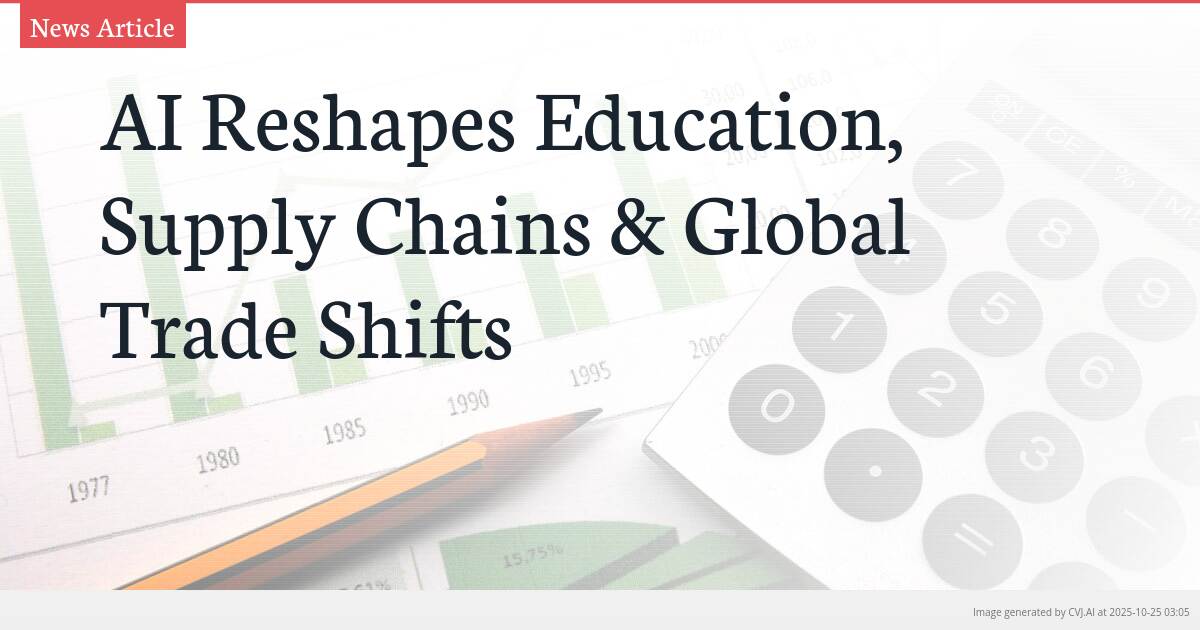This summary text is fully AI-generated and may therefore contain errors or be incomplete.
Introduction
Artificial intelligence is revolutionizing education systems and supply chain operations while shifting global trade policies create economic turbulence. From university classrooms to international shipping lanes, AI implementation is driving efficiency and resilience, even as trade disruptions threaten vulnerable economies and billion-dollar startups delay public offerings in uncertain markets.
Key Points
- AI implementation spans education reform at universities and supply chain optimization in logistics
- US trade policy changes have created significant challenges for Lesotho's textile export economy
- High-value private companies are extending their pre-IPO phases despite reaching billion-dollar valuations
AI Revolutionizes Education and University Operations
Arizona State University President Michael Crow is leading the charge in integrating artificial intelligence across educational systems, fundamentally reshaping how students learn and teachers instruct. The university’s approach demonstrates how AI technologies are being deployed to enhance educational outcomes while preparing institutions for a technology-driven future. This transformation represents a significant shift in traditional educational models, with AI enabling personalized learning experiences and more efficient administrative processes.
The implementation of AI in education extends beyond simple automation, creating adaptive learning environments that respond to individual student needs and progress. This technological integration allows educators to focus on higher-value teaching activities while AI handles routine administrative tasks and provides data-driven insights into student performance. The changes at Arizona State University signal a broader trend in educational institutions worldwide as they adapt to the demands of an increasingly digital economy.
Supply Chain Transformation Through Artificial Intelligence
Major logistics players including Waabi, Penske, and the Port of Los Angeles are leveraging artificial intelligence to create faster, smarter, and more resilient supply chains. These companies are implementing AI solutions to optimize routing, predict demand fluctuations, and enhance operational efficiency across complex global networks. The technology enables real-time decision-making and proactive problem-solving in an industry traditionally plagued by delays and inefficiencies.
The Port of Los Angeles, as one of North America’s busiest shipping hubs, represents a critical test case for AI implementation in maritime logistics. By integrating artificial intelligence into port operations, the facility can better manage container flow, reduce congestion, and improve turnaround times. Similarly, transportation giants like Penske are using AI to optimize fleet management and delivery schedules, while technology firms like Waabi develop advanced algorithms for supply chain forecasting and risk management.
Global Trade Policies Create Economic Challenges
Recent US tariff implementations and the expiration of the African Growth and Opportunity Act (AGOA) have delivered severe blows to Lesotho’s textile industry, highlighting how trade policy shifts can disproportionately impact smaller economies. As one of Africa’s smallest nations, Lesotho had built a significant portion of its economic foundation on textile exports under favorable trade agreements that have now expired or been altered by new tariff structures.
The situation in Lesotho demonstrates the vulnerability of export-dependent economies to changes in international trade relationships. The country’s textile sector, which had benefited from preferential access to US markets, now faces competitive disadvantages that threaten jobs and economic stability. This case study underscores the complex interplay between trade policy, economic development, and global market access for developing nations seeking to establish sustainable industrial bases.
The Changing Landscape for High-Value Startups
Billion-dollar startups are increasingly delaying their initial public offerings, reflecting broader market uncertainties and changing investment landscapes. This trend represents a significant shift from previous decades when companies typically sought public markets soon after achieving substantial valuations. The extended private phase allows companies to avoid the scrutiny and quarterly performance pressures of public markets while accessing substantial private capital.
The phenomenon of delayed IPOs affects multiple sectors, including education technology, logistics, and international trade—all areas experiencing rapid transformation through AI implementation. Companies in these spaces are choosing to remain private longer, leveraging venture capital and private equity funding to scale operations without the regulatory burdens and market volatility associated with public listings. This trend suggests a fundamental restructuring of how high-growth companies approach funding and growth strategies in the current economic environment.
📎 Read the original article on bloomberg.com

